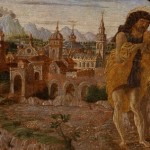 1 Peter 3:1-12
1 Peter 3:1-12
In a world that has more people in it than ever before, there is also more loneliness in the world than ever before. We often live away from our families – either geographically or in degree of harmony. We don’t know our neighbors.
People are looking for a genuinely loving community to belong to. Some look in clubs and some talk to counselors. Some choose to spend more time at work, and some join gangs.
But what if the Church were truly a community of love? We would transform the world as God has transformed us!
The source of all community is the Trinity: God the Father, God the Son, and God the Holy Spirit. God is a Three-in-One community of self-giving love. To say that God is love is to say that God is a self-giving relationship. In fact, both the Father and the Son are defined for us by their relationship to each other. Out of the Father’s love and self-giving the Son proceeds, and out of self-giving love the Son gives Himself perfectly to the Father. The Spirit is breathed out by this mutual love.
Or something like that. I don’t have time to explore the healthy re-examination of the Trinity that Western theology is undergoing (partially because I don’t understand it that well myself!), but suffice it to say that God is love and God is a holy, divine relationship, out of which the world, especially man, is lovingly created.
Being love, God not only created us but also created us as a community of love. Male and female He created them, His first commandment being to be fruitful and multiply out of this relationship of love. But then, turning from original love to pride, from self-giving to self-taking, we fell.
But God, who is love, redeemed us and has invited us to re-join His Community of Love. He has adopted us into His family if only we would love Him as He first loved us. That is the prerequisite for true relationships in a God-created, God-loved world: love.
Therefore, we can only come into God’s Community of Love, if we become a Community of Love. 1 Peter is all about the Church as God’s Community of Love here on earth. Paul refers to this Community of Love as the Body of Christ, joined with Him in divine union. Peter speaks of this Community of Love as a spiritual house (2:5), a holy nation, and God’s own special people (2:9-11). Much of the rest of 1 Peter is about how to live in love in God’s Community of Love.
In 1 Peter 3:8, we are commanded to “Be of one mind.” We have one God, one faith, one belief, one baptism, and one body. We are to have a common life ordered by the apostles’ teaching, the Sacraments, prayer, and a little thing called fellowship (Acts 2:42). The early church had a common authority of apostles, bishops, elders, and deacons. Worshiping daily in the Temple, and breaking bread daily from house to house, they were, remarkably, of one mind and one accord (Acts 2:46). Therefore, they had all things in common, not primarily their material but their most valuable possessions: themselves.
But how was this community of the early Church able to live in such unity – the unity that allowed them to share all things and the unity of the Trinity?
By the same thing that unites the Holy Trinity: the love of the Trinity. In 1 Peter 3:8 we are commanded to have compassion for one another, just as we are elsewhere commanded to have love for one another and for God. This com-passion is a passion with someone else and for someone else. It is feeling what others feel, feeling what is best for them. It is going out of self and into the self of others so that our lives are united in love.
Today, we have unprecedented freedom of choice, and so we often choose to live lives without others and without community. What nobody told us was that in so doing we have chosen to live without love. All of our communities are breaking down because they are no longer given but must now be chosen. I believe this unprecedented choice is at the heart of both “secularization” and of postmodernism.
This freedom to choose self, to choose isolation, is a freedom to not love: it is a choice for Hell. In fact, I believe that a large part of Hell is loneliness: to live without others. The other part is to live with others, only without love for these others.
But a community that loves God and one another as self is heaven. Therefore, love as
brothers (verse 9). Part of this is being tenderhearted and courteous to each other.
Part of it is in not returning evil for evil but blessing for evil. Here again is love, the love of God. For when our hearts were evil toward God, out of His self-giving, He chose to love us. And so we must love even our enemies and reach out to them in love. We must invite others into God’s Community of Love, as He first did for us.
As God, the Father-Son-Holy Spirit, shared His community of love with us, we must share ours with others. This is the true meaning of evangelism.
And in loving, we are united to God, united by His love with which He loves Himself and with which He first loved us.
Prayer: Lord, help me today to be moved to compassion, as You were moved by compassion to create and redeem, and as Your Son was moved by compassion when He saw those in need. By the giving of Yourself to me today, through Your Son and by Your Spirit, may I be so filled with Your love in my self that I may give that self to others. Amen.
Point for Meditation:
1. Is there someone in your life to whom God has asked you to show compassion or a love that reaches out of itself?
2. What does it mean to love as brothers? What does it mean to love someone who is not your brother (or even like one) as a brother?
Resolution: I resolve to reach out in love to one person today who is not by nature loveable to me.
© 2013 Fr. Charles Erlandson











